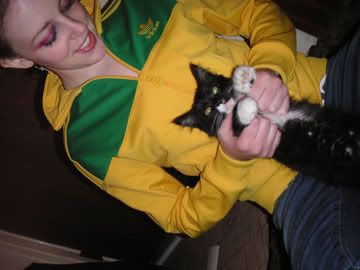I'll be quick with this one: Persepolis by Marjane Satrapi is such a quick read, you have no reason to not pick it up. Too many double negatives? Fair enough: read this graphic novel!
Readers of this blog don't need to be told that not all people living in the Middle East are crazy extremists. In fact, very few people are Islamic extremists. However, we Americans tend to forget that, and imagine every dark-haired person who knows something about Islam is going to blow us up. But like I said, if you're reading my blog, you are probably my friend, and not a douchebag. You know that the terrorists we are supposed to be afraid of are few and far between, and they aren't even all Muslims (but we fear the President, because he is a half-breed Muslin).
My point with all this? Satrapi's novel is her growing up, coming-of-age tale. She just happened to grow up in revolutionary Iran: we see her change from a precocious girl intent on reading great philosophers to a pre-teen wearing a veil and fearing the repercussions of protest. Satrapi humanizes those Middle Eastern monsters. They're real people, not caricatures wearing towels on their heads. I would love to get a class set of this and teach it to high school freshman. Being a teacher, I see daily the misunderstanding Americans have of other cultures. Many kids truly fear anyone who might hail from the Middle East, because a few crazies plot against our faultless nation. The graphic novel is an ideal medium through which to enlighten our kids.
Persepolis is just so damn engaging! It was so difficult to put down (you mean I need to answer that phone call? But it's just my job. Class is starting? Meh, they don't need me). Satrapi's illustrations are simple, but get the point across. The novel is so easy to read not only because of the clarity, but because of the events she covers. She not only writes of her heroes—her dissenting relatives and neighbors who are jailed or executed—but of her drug use and sexual experiences. It's relatable, folks, and that's why I must recommend it. She puts a face on a culture we too often fear. Yes, she's not typical—she went to French school, her parents were wealthy, their family had a maid, she didn't have to wear a veil until forced to by the state—but that doesn't matter. Just giving us one face will humanize her culture. She may not have intended to be the token, but maybe she did. It doesn't matter, though, because we really need it. The novel is also a nice little history lesson. We need more like this.
KK
Sunday, April 4, 2010
Subscribe to:
Posts (Atom)
